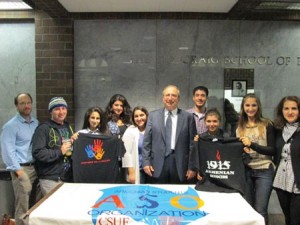Emma Shaljyan
Staff Writer

Photo: Barlow Der Mugrdechian
Middle East specialist Gregory Aftandilian was a guest of the Armenian Studies Program on Thursday, April 4, when he presented a talk on “Trans-Generational Trauma: The Impact of the Armenian Genocide on the Second Generation.”
The focus of Aftandilian’s presentation was on how the Genocide affected the offspring of the Genocide survivors. He became interested in this subject while he was writing a paper on how World War II impacted second-generation Armenian-American identity.
The advent of World War II brought the memory of the Armenian Genocide to the forefront within Armenian-American families, as survivors of the Genocide had to send their sons off to war, with all of the anxieties that entailed.
Aftandilian interviewed World War II Armenian-American veterans and found that the topic of returning home, was more emotional than the topic of their combat experience. As a comparison, the subject of trans-generational trauma has been explored extensively among children of Holocaust survivors, with more than 500 articles and books written about the subject, while in the Armenian context, it is a relatively new field.
For both Holocaust survivor parents and earlier for Armenian Genocide survivors, children were a representation of survival. Survivor parents had high expectations for their children—often treating them as substitutes for the relatives who perished and communities that had been wiped out. Armenian Genocide survivors tend to be over-protective of their children, and want to ensure their security and protection.
According to Aftandilian, the children of the Armenian Genocide bear a burden, but at the same time they want to learn more about what their parents have gone through and to rediscover their roots.
The second-generation’s efforts to seek recognition of the Armenian Genocide in the 1970s can be traced, in part, to the trans-generational trauma of the Genocide that they experienced as children of survivors.
Research on the children of survivors found that many children of Armenian Genocide survivors were named after the murdered relatives. These children felt special, because an obligation was placed on them, directly or indirectly, to bear the hopes and aspirations of the survivors—not only for the family, but also for the Armenian people as a whole.
Within some Armenian families, the Armenian Genocide was not discussed and others tried to shield their children, as much as possible, from the trauma. They didn’t want to burden their child with the vivid descriptions of what they had gone through.
By sharing his research, Aftandilian presented new insights into this fascinating topic of survival, and presented new information about the long-term impact of the Genocide.
 Hye Sharzhoom Armenian Action
Hye Sharzhoom Armenian Action